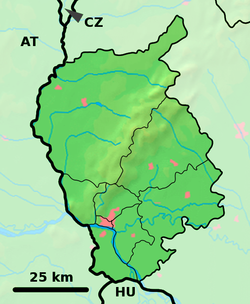Modra | |
|---|---|
Town | |
 The "Upper Gate", the only remaining fortification gate in Modra | |
Location of Modra in the Bratislava Region | |
| Coordinates: 48°19′54″N 17°18′32″E / 48.33167°N 17.30889°E | |
| Country | |
| Region | Bratislava |
| District | Pezinok |
| First mentioned | 1158 |
| Government | |
| • Mayor | Mgr. Juraj Petrakovič[1] |
| Area | |
| • Total | 49.62 km2 (19.16 sq mi) |
| Elevation | 314[3] m (1,030[3] ft) |
| Population (2023)[4] | |
| • Total | 9,201 |
| • Density | 190/km2 (480/sq mi) |
| Time zone | UTC+1 (CET) |
| • Summer (DST) | UTC+2 (CEST) |
| Postal code | 900 01[3] |
| Area code | +421 33[3] |
| Car plate | PK |
| Website | www.modra.sk |
Modra (German: Modern, Hungarian: Modor, Latin: Modur) is a city and municipality in the Bratislava Region in Slovakia. It has a population of 9,201 as of 2013. It nestles in the foothills of the Malé Karpaty (Little Carpathian mountains) and is an excellent centre for hiking.
Modra is famous for its pottery industry. Its blue-and-white porcelain is famous throughout Slovakia.
It is also known as one of the most important viticulture centres in the Little Carpathians region.
Besides the main town, there are also other adjacent settlements incorporated in the municipality: former vassalage viticulture village Kráľová and two recreational hamlets of Harmónia and Piesok (also known as Zochova Chata), both located in the woods of Little Carpathians mountains.
- ^ "MGR. Juraj Petrakovič | Primátor | Modra".
- ^ Statistical Office of the Slovak Republic (www.statistics.sk). "Hustota obyvateľstva - obce". www.statistics.sk. Retrieved 2024-02-08.
- ^ a b c d "Základná charakteristika". www.statistics.sk (in Slovak). Statistical Office of the Slovak Republic. 2015-04-17. Retrieved 2022-03-31.
- ^ "Počet obyvateľov podľa pohlavia - obce (ročne)". www.statistics.sk (in Slovak). Statistical Office of the Slovak Republic. 2023. Retrieved 2024-08-10.


